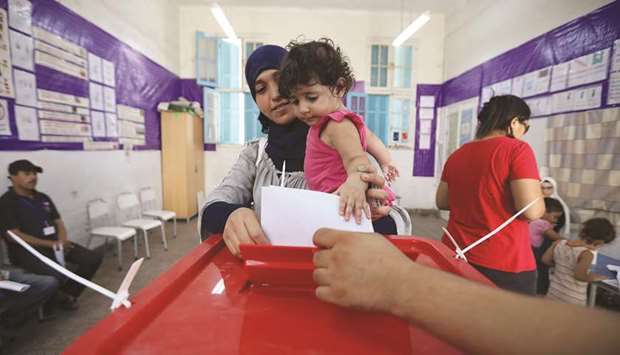Vote counting began late yesterday after polls closed in Tunisia’s hotly contested presidential election, seen as crucial to strengthening the nascent democracy in the country roiled by economic woes and militancy.
The head of the electoral commission, Nabil Baffoun, told a press briefing that turnout stood at 35% as of 5pm (1600 GMT), an hour before the polls closed.
The independent commission had called on the electorate to vote in large numbers.
Around 7.2mn people were registered to vote in around 4,567 polling stations across Tunisia in the single-day balloting.
Earlier yesterday, interim Tunisian President Mohamed Ennaceur urged his compatriots to vote en masse.
“High-percentage voting will boost national unity and deepen confidence in the future,” he told reporters at a polling centre in a suburb of the capital, Tunis.
“The people are the ones who will choose who will lead them, steer the helm of the country and improve the situation in Tunisia,” he added.
Tunisia’s presidential elections, originally scheduled for November, were pushed forward after the country’s first democratically elected president, Beji Caid Essebsi, died in July, five months before the end of his term.
The North African country has struggled with an economic slowdown, social unrest triggered by the 2011 uprising that toppled long-time autocrat Zine El Abidine Ben Ali, and subsequent extremist attacks.
The unemployment rate in Tunisia stands at 15.3%. Some voters expressed hope that the polls, in which 26 contenders are vying for the presidency, will reshape the country for the better. “I hope there will be change,” said Mourad Razki, a state worker, after voting in Tunis.
“I hope the new president will be acquainted with the country’s hard economic situation and the tough living conditions of people,” he said. Kheir Eddin Abadli, a first-time voter, had similar wishes. “For sure, I am not happy about the current governing scene. I look forward to change,” the 19-year-old man said.
Yesterday’s polls are Tunisia’s second democratic presidential vote since the 2011 revolt. Front-runners in the presidential race include incumbent Prime Minister Youssef Chahed, the deputy head of the influential Ennahda movement, Abdelfattah Morou, and former defence minister Abdelkarim Zbidi.
Also running is media magnate Nabil Karoui, who was arrested last month on charges of money laundering and tax evasion.
Two female candidates — former tourism minister Salma Loumi and politician Abeer Mousa, seen as a loyalist of Ben Ali — are also standing. The day before the election, two of the 26 candidates — Slim Riahi and Mohsen Marzouk — said they were pulling out in favour of Zbidi, who is running as an independent.
However, the withdrawals have made no legal change to the number of presidential hopefuls, according to experts.

A woman carries a child as she casts her vote at a polling station during the presidential election in Tunis, yesterday.
